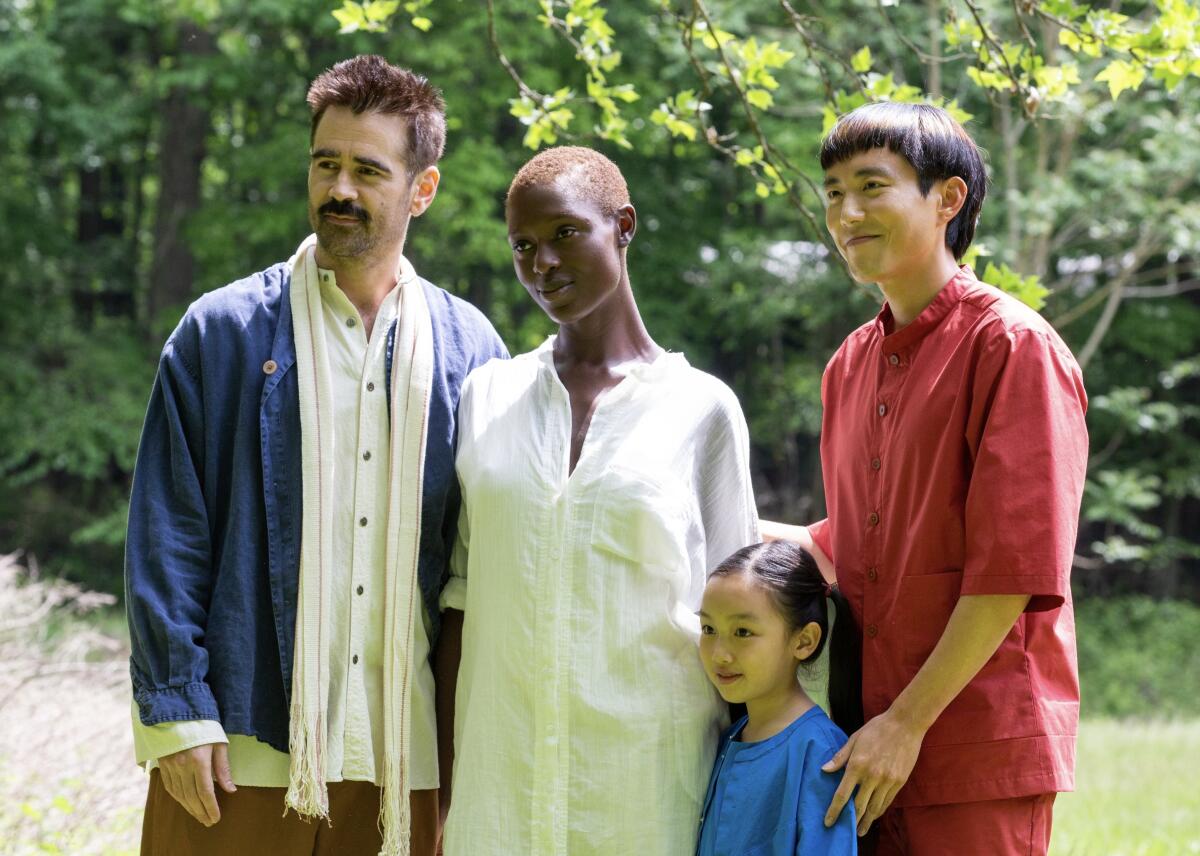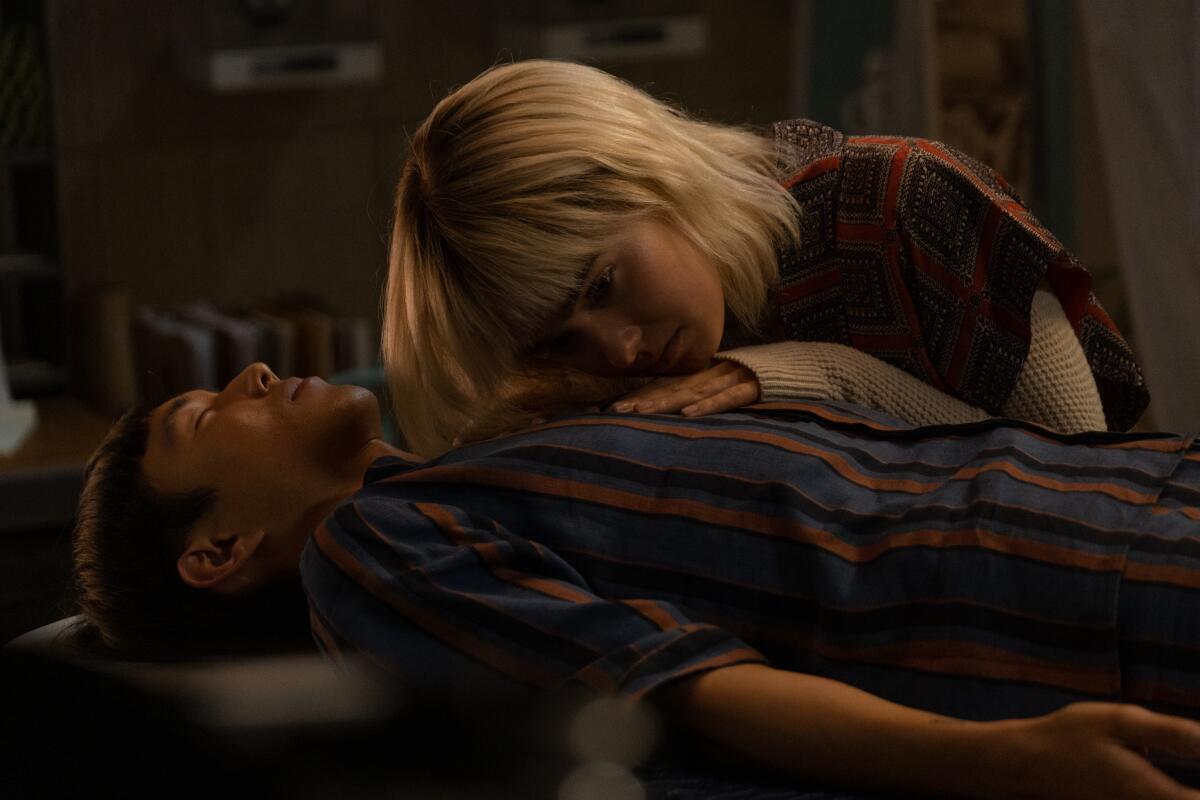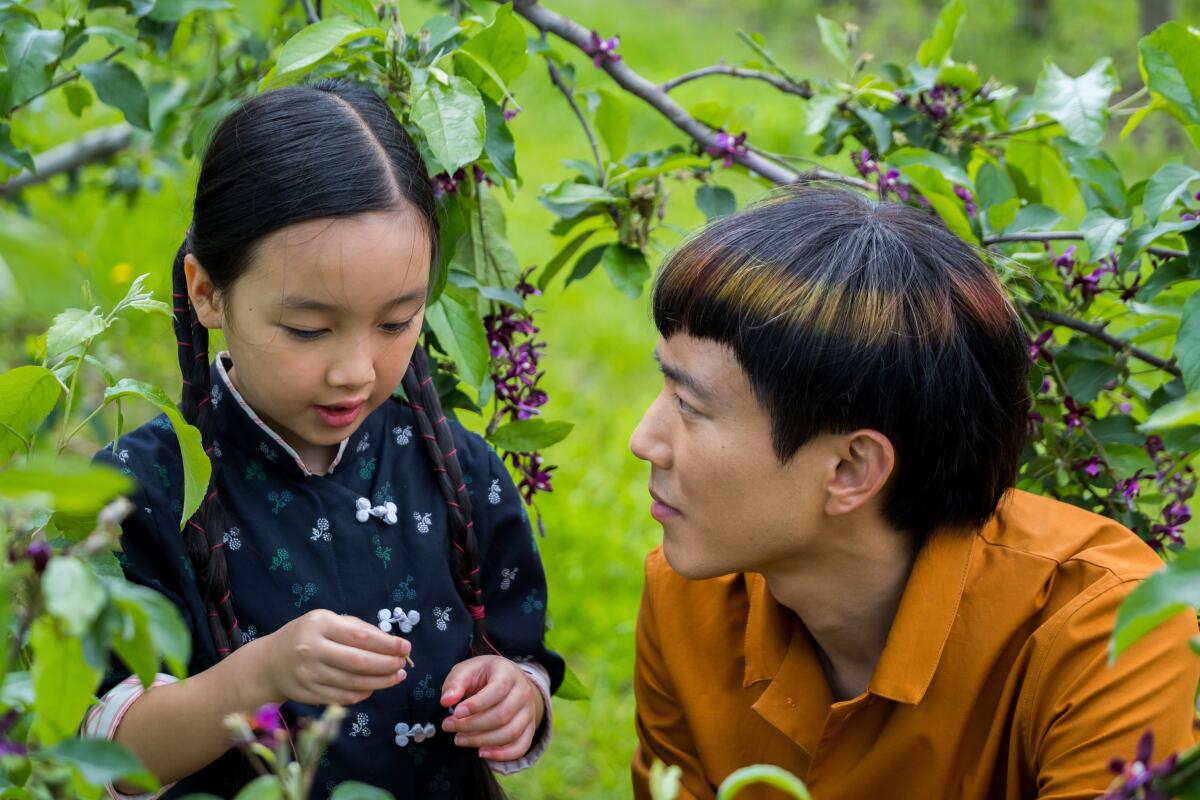Review: ‘After Yang,’ with Colin Farrell, is a beautifully human glimpse of a posthuman world

- Share via
About halfway through “After Yang,” an exquisite dispatch from a hazily defined future, Jake (Colin Farrell), a tea-shop proprietor, initiates his son, Yang (Justin H. Min), into some of the mysteries of his trade. What sets one kind of tea apart from another? The taste, certainly, but also the fullness of what that taste conveys: the leaves that were harvested and processed; the soil from which the plants sprang; the rain that watered the soil; the people who cultivated the soil and their entire culture, history and way of life. Crediting these insights to a 2007 documentary, “All in This Tea” (and doing a damn good Werner Herzog impression), Jake eventually stops talking and takes a sip. Tea, easy to enjoy, is rather harder to put into words.
The same is true of some movies, and “After Yang,” the second feature from the Korean American writer-director Kogonada (“Columbus”), is very much its own subtle, bittersweet and curiously intoxicating brew. The experience of watching it produces readily identifiable flavors and associations: It’s a gentle-toned family drama and a moody futuristic fable, with a faint techno-paranoid aroma, a melancholy mouthfeel and a lingering aftertaste of existential unease. Viewers who admire some of the filmmakers Kogonada admires (he’s made several superb video essays about them) will detect trace influences here and there, though I suspect they will also be impressed by how deftly he synthesizes those influences into something that transcends imitation.
For your safety
The Times is committed to reviewing theatrical film releases during the COVID-19 pandemic. Because moviegoing carries risks during this time, we remind readers to follow health and safety guidelines as outlined by the CDC and local health officials.
To wit: At various points Jake keeps in touch with his wife, Kyra (Jodie Turner-Smith), using a system of gadget-less remote communication that Kogonada represents by having the actors speak directly into his camera — a technique that readily (but sparingly) evokes the work of the late Japanese master Yasujiro Ozu. But the affinity is more than a matter of precise cuts and static images. (“After Yang” was shot in mostly rigid widescreen compositions by Benjamin Loeb; Kogonada served as his own editor.) There is something of Ozu’s restraint in the way this movie dramatizes a sad moment of change, a transformation that impacts a family not through noisy eruptions of melodrama but through small, almost imperceptible ripples of emotional disturbance.
If this were Ozu, though, it would have to be titled “I Was Born Bot.” Yang is a “technosapien,” a sophisticated flesh-and-metal android whom Jake and Kyra bought as a big brother and teacher for their daughter, Mika (Malea Emma Tjandrawidjaja), when they adopted her as a baby from China. Now Mika is in elementary school, and Yang, who teaches her Chinese and is a wellspring of facts about her birth country’s history and culture, has practically become a member of the family. I say “practically” because when Yang suddenly breaks down — a malfunction that feels synonymous with death, even if it can’t technically be described as such — Jake, Kyra and Mika are thrown into a state of anguish but also confusion, left to fumble their way through stages of grief with few clear precedents or definitions.

Kyra, cool, pragmatic and somewhat frustrated by Jake’s over-reliance on Yang as a babysitter, believes they should accept their loss and move on. Jake and Mika hold out hope that Yang can be repaired, even after he’s deemed unsalvageable by a shady technician (Ritchie Coster) and a high-minded museum researcher (Sarita Choudhury), both of whom want to use Yang’s parts for their own purposes. These moments help fill in our understanding of this unspecified future, where artificial intelligence and human cloning are constant but not fully comprehended realities. We learn a bit more from a friendly neighbor (Clifton Collins Jr.) whom Jake looks down on for having clone children, a personal prejudice against which the movie will gently push back.
For the most part, though, our vantage is sharply limited; if there are any dystopian dangers, they are mostly hidden from view. In striking contrast with “Columbus,” Kogonada’s 2017 ode to the glories of Midwestern modernism, “After Yang” has few exterior establishing shots. The self-driving vehicles that carry Jake, Mika and Yang to their appointments are glimpsed only from the inside. Most of the story unfolds at home, a softly lit warren of leafy houseplants, balsa-tone furnishings and minimalist East Asian influences; it’s lovely enough for a magazine spread, but there’s a nicely rumpled quality to its wind-chimey elegance. It’s a home you might expect for a family whose own unconventional makeup — white father, Black mother, two Chinese kids — suggests a microcosm of the new globalist order.
Whether Yang can even be called Chinese is one of the movie’s more intriguing lines of inquiry, and Min’s performance invests it with a playful philosophical weight. Some of the tenderest moments transpire between Yang and Mika, whose close bond suggests that a shared species can be less unifying than a common culture. The movie is sensitive to Mika’s feelings of loneliness and alienation, even as its visual design embodies a harmonious balance between East and West. But it is no less attuned to Yang’s hidden humanity, the strange alchemy that can, with time and attention, lend a robot’s internal circuitry the contours of a soul.

One word for that alchemy is “memory.” Some of the movie’s most affecting moments — ushered along by the music of Aska Matsumiya and Ryuichi Sakamoto — find Jake sifting through Yang’s memory bank, a trove of short video clips that provide a window into what may be independent thoughts. What does a robot consider memorable? A towering tree? A dancing child? A new friend (played by “Columbus’” Haley Lu Richardson)? In these moments, “After Yang” could be paying homage to the similarly titled “After Life,” Hirokazu Kore-eda’s 1999 film about the quest to locate and preserve a single, perfect memory. And it’s not just a common name that reminded me of the late Taiwanese auteur Edward Yang, whose great family drama “Yi Yi” — another story about marital strain, gradual loss, a father’s journey, a child’s reckoning — finds conscious and unconscious echoes here.
All these whispery abstractions and cinephile allusions can feel like too much, or perhaps too little. But as he demonstrated in “Columbus,” Kogonada has a gift for merging the meditative distance often associated with art cinema and the beats of an absorbing, character-driven narrative. Every person in this movie can seem terribly isolated at times, but Kogonada opens up distances in order to bridge them. In time his visual style relaxes as Jake and Kyra begin separately reconstructing their own memories of Yang, replaying them with different words and from different angles. The camera abandons its rigid stance and moves in close, as if to suggest that the very act of remembering, and of loving the one you remember, can be a gently world-shaking act.
Another way of putting it is that “After Yang,” for all its restraint, is alive to the special power of actors. And Kogonada has a superb one in Farrell, whose gaze, mournful and curious by turns, carries the weight of this movie’s speculative inquiry. It’s both coincidental and instructive that while Farrell can be seen acting up a storm in another movie opening this week — something about a bat and a man — it’s his quietly assured work here that hints at the full scope of what he can do. In “The Lobster” and “The Killing of a Sacred Deer,” the director Yorgos Lanthimos aptly recognized that Farrell’s physical beauty could be an obstacle, that a dad bod and a tragicomic makeover might unearth his deeper dimensions as an actor. He’s beautiful again in “After Yang,” but those dimensions remain, and perhaps resonate all the more, in a story that teases out humanity where you might not think to look.
‘After Yang’
Rating: PG, for some thematic elements and language
Running time: 1 hour, 35 minutes
Playing: Starts March 4 at Alamo Drafthouse Cinema Downtown Los Angeles and the Landmark, West Los Angeles; also streaming via Showtime
More to Read
Only good movies
Get the Indie Focus newsletter, Mark Olsen's weekly guide to the world of cinema.
You may occasionally receive promotional content from the Los Angeles Times.











